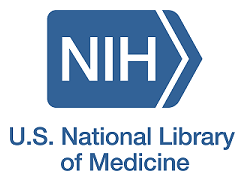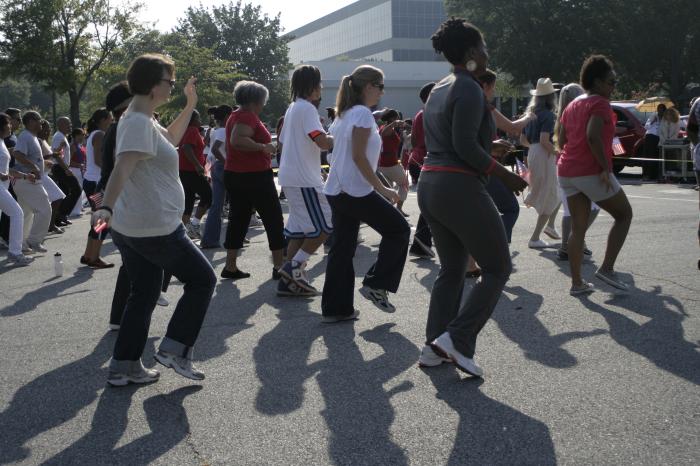

To Your Health: NLM update Transcript
Exercise reduces cancer risks: 07/18/2016

Image: Courtesy of the Centers for Disease Control
Greetings from the National Library of Medicine and MedlinePlus.gov
Regards to all our listeners!
I'm Rob Logan, Ph.D., senior staff, U.S. National Library of Medicine (NLM).
Here is what's new this week in To Your Health - a consumer health oriented podcast from NLM - that helps you use MedlinePlus to follow up on weekly topics.
Moderate exercise is associated with a reduced risk of 13 types of cancer in an international,comprehensive study recently published in JAMA Internal Medicine.
Specifically, the study suggests physical activity is associated with a lower risk of kidney cancer, liver cancer, myeloid leukemia, colon, breast, and endometrial cancers. While associations among physical activity and reduced risks for colon, breast, and endometrial cancers previously have been suggested, the study reinforces these findings and adds new cancer risk reductions to the list.
The study's 32 authors (who are from the National Cancer Institute and the American Cancer Society) add the associations between physical activity and reduced cancer risks also are generalizable for the first time to adults who are overweight or obese, or persons with a history of smoking.
The authors recommend (and we quote): 'Health care professionals counseling inactive adults should promote physical activity as a component of a healthy lifestyle and cancer prevention' (end of quote).
The study operationally defines leisure activity as self-imposed exercises, such as walking, running, swimming or other moderate to vigorous intensity activities. The median level of physical activity in the study is about 150 minutes of moderate intensity per week, which the authors note is the current, recommended minimal level of physical activity for Americans.
The study is different than past research because it pools data on 1.44 million people, ages 19 to 98, from the U.S. and Europe. Participants within the selected sample also were followed for a median period of 11 years. Although the authors note previous studies suggested an association between physical activity and cancer risk reduction, prior research was not based on a similarly sized, large sample of adults followed for a similar length of time.
In a commentary that accompanies the study, its three authors summarize (and we quote): 'In this robust study, the authors were able to demonstrate that leisure-time activity was associated with a reduced risk of approximately half of the cancer types examined (including three of the four cancers most commonly diagnosed among men and women worldwide)' (end of quote).
The commentary's authors add (and we quote): 'Furthermore, for more than one-quarter of the cancer types, physical activity was associated with greater than 20 percent risk reduction (of some cancers)' (end of quote).
In response to these impressive findings, a guide to help you start your own exercise program (provided by the U.S. Department of Health and Human Services) is available within the 'start here' section of MedlinePlus.gov's exercise and physical fitness health topic page.
The American Heart Association explains how physical activity also improves your quality of life within the 'start here' section of MedlinePlus.gov's exercise and physical fitness health topic page.
MedlinePlus.gov's exercise and physical fitness health topic page also provides many links to help you begin and maintain exercise programs, including tips for teens, women, and seniors.
MedlinePlus.gov's exercise and physical fitness health topic page additionally provides links to the latest pertinent journal research articles, which are available in the 'journal articles' section. Links to relevant clinical trials that may be occurring in your area are available within the 'clinical trials' section. You can sign up to receive updates about exercise and physical fitness as they become available on MedlinePlus.gov.
To find MedlinePlus.gov's exercise and physical fitness health topic page please type 'exercise' in the search box on MedlinePlus.gov's home page, then, click on 'exercise and physical fitness (National Library of Medicine).'
Before I go, this reminder... MedlinePlus.gov is authoritative. It's free. We do not accept advertising .... and it is written to help you.
To find MedlinePlus.gov, just type 'MedlinePlus.gov' in any web browser, such as Firefox, Safari, Chrome, or Explorer, on any platform.
We encourage you to use MedlinePlus and please recommend it to your friends. MedlinePlus is available in English and Spanish. Some medical information is available in 48 other languages.
Your comments about this or any of our podcasts are always welcome.
Please email the podcast staff anytime at: NLMDirector@nlm.nih.gov
A written transcript of recent podcasts is available by typing 'To your health' in the search box on MedlinePlus.gov's home page.
The National Library of Medicine is one of 27 institutes and centers within the National Institutes of Health. The National Institutes of Health is part of the U.S. Department of Health and Human Services.
A disclaimer — the information presented in this program should not replace the medical advice of your physician. You should not use this information to diagnose or treat any disease without first consulting with your physician or other health care provider.
It was nice to be with you. Please join us here next week and here's to your health!


































No hay comentarios:
Publicar un comentario